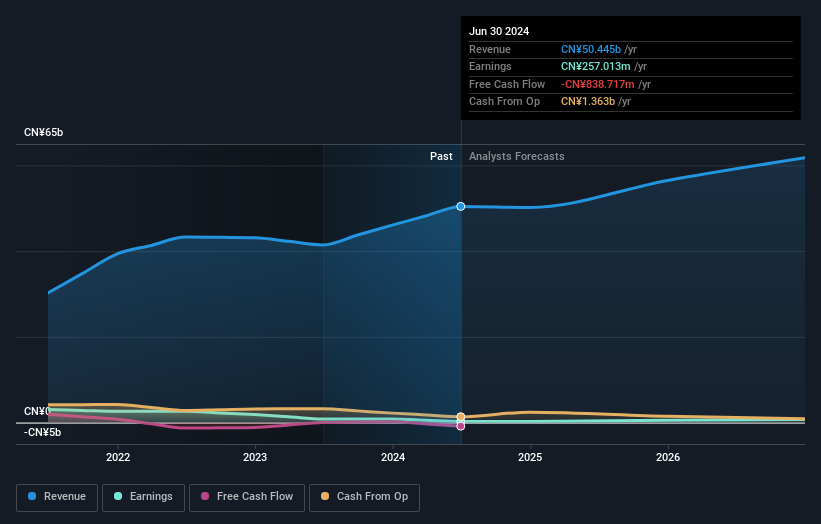Insiders have been selling China Risun Group Limited (HKG:1907) recently yet still hold a significant stake; 5.0% drop last week not ideal
Key Insights
- Insiders appear to have a vested interest in China Risun Group's growth, as seen by their sizeable ownership
- The largest shareholder of the company is Xuegang Yang with a 73% stake
- Recent sales by insiders
To get a sense of who is truly in control of China Risun Group Limited (HKG:1907), it is important to understand the ownership structure of the business. And the group that holds the biggest piece of the pie are individual insiders with 73% ownership. In other words, the group stands to gain the most (or lose the most) from their investment into the company.
Even though insiders have sold shares recently, the group owns the most numbers of shares in the company. As a result, they were also the group to endure the biggest losses as the stock fell by 5.0%.
In the chart below, we zoom in on the different ownership groups of China Risun Group.
View our latest analysis for China Risun Group

What Does The Institutional Ownership Tell Us About China Risun Group?
Institutions typically measure themselves against a benchmark when reporting to their own investors, so they often become more enthusiastic about a stock once it's included in a major index. We would expect most companies to have some institutions on the register, especially if they are growing.
Less than 5% of China Risun Group is held by institutional investors. This suggests that some funds have the company in their sights, but many have not yet bought shares in it. If the business gets stronger from here, we could see a situation where more institutions are keen to buy. We sometimes see a rising share price when a few big institutions want to buy a certain stock at the same time. The history of earnings and revenue, which you can see below, could be helpful in considering if more institutional investors will want the stock. Of course, there are plenty of other factors to consider, too.

China Risun Group is not owned by hedge funds. Looking at our data, we can see that the largest shareholder is the CEO Xuegang Yang with 73% of shares outstanding. This implies that they possess majority interests and have significant control over the company. Investors usually consider it a good sign when the company leadership has such a significant stake, as this is widely perceived to increase the chance that the management will act in the best interests of the company. In comparison, the second and third largest shareholders hold about 2.7% and 1.0% of the stock.
Researching institutional ownership is a good way to gauge and filter a stock's expected performance. The same can be achieved by studying analyst sentiments. There is some analyst coverage of the stock, but it could still become more well known, with time.
Insider Ownership Of China Risun Group
While the precise definition of an insider can be subjective, almost everyone considers board members to be insiders. Company management run the business, but the CEO will answer to the board, even if he or she is a member of it.
I generally consider insider ownership to be a good thing. However, on some occasions it makes it more difficult for other shareholders to hold the board accountable for decisions.
Our information suggests that insiders own more than half of China Risun Group Limited. This gives them effective control of the company. Insiders own HK$7.9b worth of shares in the HK$11b company. That's extraordinary! It is good to see this level of investment. You can check here to see if those insiders have been selling any of their shares.
General Public Ownership
The general public, who are usually individual investors, hold a 22% stake in China Risun Group. While this size of ownership may not be enough to sway a policy decision in their favour, they can still make a collective impact on company policies.
Next Steps:
While it is well worth considering the different groups that own a company, there are other factors that are even more important. Like risks, for instance. Every company has them, and we've spotted 3 warning signs for China Risun Group (of which 1 is potentially serious!) you should know about.
If you are like me, you may want to think about whether this company will grow or shrink. Luckily, you can check this free report showing analyst forecasts for its future.
NB: Figures in this article are calculated using data from the last twelve months, which refer to the 12-month period ending on the last date of the month the financial statement is dated. This may not be consistent with full year annual report figures.
New: AI Stock Screener & Alerts
Our new AI Stock Screener scans the market every day to uncover opportunities.
• Dividend Powerhouses (3%+ Yield)• Undervalued Small Caps with Insider Buying• High growth Tech and AI CompaniesOr build your own from over 50 metrics.
Explore Now for FreeHave feedback on this article? Concerned about the content? Get in touch with us directly. Alternatively, email editorial-team (at) simplywallst.com.This article by Simply Wall St is general in nature. We provide commentary based on historical data and analyst forecasts only using an unbiased methodology and our articles are not intended to be financial advice. It does not constitute a recommendation to buy or sell any stock, and does not take account of your objectives, or your financial situation. We aim to bring you long-term focused analysis driven by fundamental data. Note that our analysis may not factor in the latest price-sensitive company announcements or qualitative material. Simply Wall St has no position in any stocks mentioned.
免责声明:投资有风险,本文并非投资建议,以上内容不应被视为任何金融产品的购买或出售要约、建议或邀请,作者或其他用户的任何相关讨论、评论或帖子也不应被视为此类内容。本文仅供一般参考,不考虑您的个人投资目标、财务状况或需求。TTM对信息的准确性和完整性不承担任何责任或保证,投资者应自行研究并在投资前寻求专业建议。
热议股票
- 1
- 2
- 3
- 4
- 5
- 6
- 7
- 8
- 9
- 10